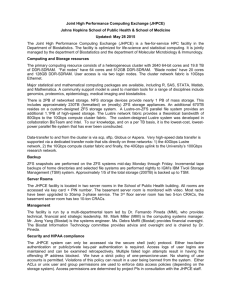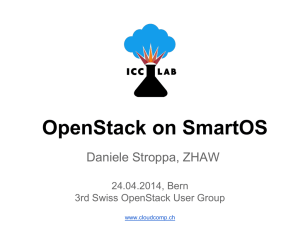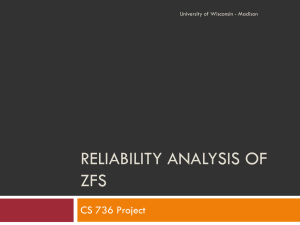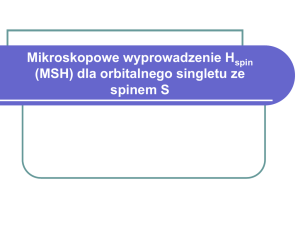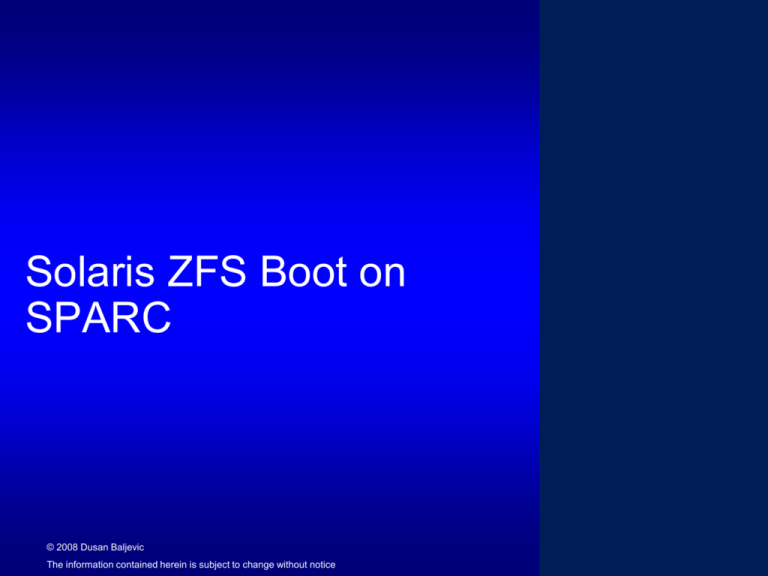
Solaris ZFS Boot on
SPARC
© 2008 Dusan Baljevic
The information contained herein is subject to change without notice
Traditional File Systems and ZFS
March 19, 2016
Dusan Baljevic
2
ZFS Goals
• Pooled storage design makes for easier administration
• No need for a Volume Manager
• Straightforward commands and a GUI
• Snapshots & clones
• Quotas and reservations
• Compression
• Pool migration
• ACLs for security
• Dynamic striping
• Dynamic resilvering
• Dynamic resizing
March 19, 2016
Dusan Baljevic
3
ZFS Overheads
• Compression
• Checksum - It has been measured to consume very roughly
1 Ghz of CPU to checksum 500MB/sec of data
• RAID-Z
As of the Solaris 10 11/06 release, checksum, compression,
and RAID-Z parity computation all occur in the context of the
thread synching pool data. Under load, that thread may be a
performance choke point. It is expected that in future
releases all these computations will be done in concurrent
threads. Compression is no longer single-threaded via CR
6460622, and is part of the Solaris 10 8/07 release
March 19, 2016
Dusan Baljevic
4
Solaris – ZFS Boot Project
The ZFS Boot project has been divided into three areas:
x86
boot, SPARC boot, and install.
The main phases of the project are:
• A ZFS plug-in for the GRUB boot loader (available since
OpenSolaris snv_62)
• Development of a boot loader on SPARC
• Enhancements necessary for implementing a ZFS root file
systems
• Enhancements to the Solaris install and LiveUpgrade
features in order to set up and maintain root file systems
in ZFS pools
March 19, 2016
Dusan Baljevic
5
Solaris ZFS with AVS
•
•
Sun StorageTek Availability Suite (AVS), Remote Mirror
Copy and Point-in-Time Copy services, previously known
as SNDR (Sun Network Data Replicator) and II (Instant
Image), are similar to the Veritas VVR (volume replicator)
and Flashsnap (point-in-time copy) products, is currently
available in the Solaris Express release
SNDR differs from the ZFS send and recv features, which
are time-fixed replication features. For example, you can
take a point-in-time snapshot, replicate it, or replicate it
based on a differential of a prior snapshot. The
combination of AVS II and SNDR features, also allows
you to perform time-fixed replication. The other modes of
the AVS SNDR replication feature allows you to obtain
CDP (continuous data replication). ZFS does not currently
have this feature
March 19, 2016
Dusan Baljevic
6
Solaris ZFS – Third-Party Backups
•
Sun StorEdge Enterprise Backup Software (Legato
Networker 7.3.2 and above) product can fully back up and
restore ZFS files including ACLs
•
EMC Networker version 7.3.2 and above backs up and
restores ZFS file systems, including ZFS ACLs
•
Veritas NetBackup version 6.5 and above can backup and
restore ZFS file systems, including ZFS ACLs
•
IBM Tivoli Storage Manager client software (5.4.1.2)
backs up and restores ZFS file systems with both the CLI
and the GUI. ZFS ACLs are also preserved
•
Computer Associates' BrightStor ARCserve product backs
up and restores ZFS file systems, but ZFS ACLs are not
preserved
March 19, 2016
Dusan Baljevic
7
Solaris ZFS and Data Protector
Back Agents (Disk Agents)
ZFS support: Solaris 10 (including ACL support) 6.0
Released
ZFS support: Solaris 10 (excluding ACL support) 5.5
Released
Data Protector supports ZFS now.
March 19, 2016
Dusan Baljevic
8
ZFS Boot Lab Server
HOSTNAME
sft3
FQDN
sft3.mydom.dom
MODEL
SUNW,Sun-Fire-T2000
UNAME -A
SunOS 5.11 snv_97 sun4v
ARCH
64-bit sparcv9 kernel
RUN LEVEL
3
PHYSICAL MEMORY
8 GB
CPU
32 x 1000MHz virtual CPUs
PAGESIZE
8192 bytes
VOLUME MANAGER COUNT SINGLE Volume Manager
VOLUME MANAGER
Zettabyte File System (ZFS)
March 19, 2016
Dusan Baljevic
9
Solaris – ZFS Disks
ZFS applies an EFI label when creating a storage pool with
whole disks. Disks can be labelled with a traditional Solaris
VTOC label when creating a storage pool with a disk slice.
Slices should only be used under the following conditions:
• The device name is non-standard
• A single disk is shared between ZFS and another file
system, such as UFS
• A disk is used as a swap or a dump device
• Disk is used for booting the operating system *
March 19, 2016
Dusan Baljevic
10
Solaris – EFI Versus VTOC (SMI) Labels
EFI is a new disk label that was introduced in the Solaris 9 4/03 Operating
System version. The acronym EFI stands for Extensible Firmware
Interface and this new label format is REQUIRED for all devices over 1 TB
in size, and cannot be converted back to VTOC.
• Supported by 64-bit Solaris 9 Operating System (04/03) and above
• Provides support for disks greater than 1 TB in size
• Provides 7 useable slices - 0 thru 6 - where slice 2 is just another slice
• Solaris ZFS uses EFI labels by default
• Partitions (or slices) cannot overlap with the primary or backup label, or
with any other partitions. The size of the EFI label is usually 34 sectors, so
partitions start at sector 34. This feature means no partition can start at
sector zero (0)
March 19, 2016
Dusan Baljevic
11
Solaris – EFI Versus VTOC (SMI) Labels
(continued)
• No cylinder or head information is stored in the label. Sizes are reported
in sectors and blocks
• Information that was stored in the alternate cylinders area, the last two
cylinders of the disk, is now stored in slice 8
• With the "format" utility to change partition sizes, the unassigned partition
tag is assigned to partitions with sizes equal to zero. By default, the
"format" utility assigns the "usr" partition tag to any partition with a size
greater than zero. You can use the "partition change" menu to reassign
partition tags after the partitions are changed. You cannot change a
partition with a non-zero size to the "unassigned" partition tag
• EFI labels CAN be written to disks smaller than 1TB, where a standard
VTOC label would normally apply, but VTOC cannot be forced onto
devices larger than 1TB. This can be done by running "format -e". When
you attempt to "label" the disk, you will be asked which type of label is to
be written with
March 19, 2016
Dusan Baljevic
12
Solaris – EFI Restrictions
• The layered software products not intended for systems with EFI-labelled
disks might be incapable of accessing a disk with an EFI disk label. (for
example, current VxVM versions). A disk with an EFI disk label is not
recognized on systems running previous Solaris releases. Adding an EFIlabelled disk to a system that does not support it:
Dec 3 09:12:17 <hostname> scsi: WARNING:
/sbus@a,0/SUNW,socal@d,10000/sf@1,0/ssd@w50020f23000002a4,0
(ssd1): corrupt label - wrong magic number
• Cannot boot from a disk with an EFI disk label
• Cannot use the Solaris Management Console Disk Manager Tool to
manage disks with EFI labels. Use the "format" utility or the Solaris
Management Console Enhanced Storage Tool to manage disks with EFI
labels, after you use the 'format' utility to partition the disk
March 19, 2016
Dusan Baljevic
13
Solaris – EFI Restrictions (continued)
• The EFI specification prohibits overlapping slices. The whole disk is represented
by "c#t#d#p6":
lrwxrwxrwx 1 root root 70 Nov 25 18:54 c8t1d0p6 ->
../../devices/.../ssd@w50020f23000004aa,0:wd
• The following format options are not applicable on disks with EFI labels:
o The "save" option is not supported because disks with EFI labels do not need
an entry in the "format.dat" file
o The "backup" option is not applicable because the disk driver finds the
primary label and writes it back to the disk
• In the context of SunCluster 3.0/3.1 (refer to Sun Solution 213130):
# scgdevs
Could not stat: /dev/rdsk/../../devices/pci@1c,600000/scsi@2,1/sd@8,0:h,raw
path not loaded.
# prtvtoc /dev/did/rdsk/d4s2
prtvtoc: /dev/did/rdsk/d4s2: No such device or address
March 19, 2016
Dusan Baljevic
14
EFI Versus VTOC Disk Label *
# format -e c0t8d0
selecting c0t8d0
[disk formatted]
FORMAT MENU:
disk
- select a disk
type
- select (define) a disk type
partition - select (define) a partition table
current - describe the current disk
format - format and analyze the disk
repair - repair a defective sector
label
- write label to the disk
analyze - surface analysis
defect - defect list management
backup - search for backup labels
verify - read and display labels
save
- save new disk/partition definitions
inquiry - show vendor, product and revision
scsi
- independent SCSI mode selects
cache
- enable, disable or query SCSI disk cache
volname - set 8-character volume name
!<cmd> - execute <cmd>, then return
quit
format> l
[0] SMI Label
[1] EFI Label
Specify Label type[1]: 0
Warning: This disk has an EFI label. Changing to SMI label will erase all current
partitions.
Continue? y
Auto configuration via format.dat[no]? y
March 19, 2016
Dusan Baljevic
15
Solaris – ZFS Boot Disk Slices
Two internal disks were available on SunFire T-2000:
c0t0d0
c0t1d0
The following slices were created on c0t0d0:
Current partition table (original):
Total disk cylinders available: 14087 + 2 (reserved cylinders)
Part
Tag
Flag
0
root
wm
1 unassigned wm
2 backup wm
3 unassigned wm
4 unassigned wm
5 unassigned wm
6 unassigned wm
7 unassigned wm
March 19, 2016
Cylinders
0 - 14086
0
0 - 14086
0
0
0
0
0
Size
Blocks
68.35GB (14087/0/0) 143349312
0
(0/0/0)
0
68.35GB (14087/0/0) 143349312
0
(0/0/0)
0
0
(0/0/0)
0
0
(0/0/0)
0
0
(0/0/0)
0
0
(0/0/0)
0
Dusan Baljevic
16
Solaris – ZFS Recommendations
• Run ZFS on a system that runs a 64-bit kernel
• 1 GB or more of physical memory is recommended
Approximately 64 KB of memory is consumed per mounted ZFS file system.
On systems with many ZFS file systems, it is recommended to have 1 GB of
extra memory for every 10,000 mounted file systems including snapshots. Be
prepared for longer boot times on these systems as well.
• The minimum amount of available pool space that is required for a bootable
ZFS root file system is larger than for a bootable UFS root file system because
swap and dump devices are not shared in a ZFS root environment. In addition,
the swap and dump devices are sized at 1/2 the size of RAM, but no more than
2 GB and no less than 512 MB (starting at build 96)
• The minimum amount of available pool space for a bootable ZFS root file
system depends upon the amount of physical memory, the disk space
available, and the number of BEs to be created. Approximately 1 GB of
memory and at least 32 GB of disk space are recommended
March 19, 2016
Dusan Baljevic
17
Solaris – ZFS Recommendations
(continued)
• Because
ZFS caches data in kernel addressable memory,
the kernel sizes will possibly be larger than with other file
systems. Configure additional disk-based swap to account
for this difference for systems with limited RAM. Use the
size of physical memory as an upper bound to the extra
amount of swap space that might be required
• If possible, do not use slices on the same disk for both
swap space and ZFS file systems. Keep the swap areas
separate from the ZFS file systems. The best policy is to
have enough RAM so that your system does not normally
use the swap devices
March 19, 2016
Dusan Baljevic
18
Solaris – ZFS Root File System
Recommendations
Keep the root pool (the pool with the dataset that is allocated for the
root file system) separate from pools that are used for data:
• Some limitations on root pools exist that you would not want to place
on data pools. Mirrored pools and pools with one disk will be
supported. RAID-Z or unreplicated pools with more than one disk will
not be supported
• Data pools can be architecture-neutral. It might make sense to move
a data pool between SPARC and Intel. Root pools are pretty much tied
to a particular architecture
• As a good practice, it is recommended to separate the "personality" of
a system from its data
March 19, 2016
Dusan Baljevic
19
Solaris ZFS Boot Installation
•
Solaris Express Community Edition snv_97 SPARC
(Solaris 10 Update 6 is the first official release, Nov 2008)
•
Boot off the DVD
Choose Filesystem Type
────────────────────────────────────
Select the filesystem to use for your Solaris installation
[] UFS
[X] ZFS
March 19, 2016
Dusan Baljevic
20
Solaris ZFS Boot Installation (continued)
Select Software
───────────────────────────────────────────
Select the Solaris software to install on the system.
NOTE: After selecting a software group, you can add or remove
software by customizing it. However, this requires understanding of
software dependencies and how Solaris software is packaged.
[X] Entire Distribution plus OEM support
....... 8527.00 MB
[ ] Entire Distribution
........................ 8495.00 MB
[ ] Developer System Support
................... 8190.00 MB
[ ] End User System Support
.................... 6178.00 MB
[ ] Core System Support
........................ 907.00 MB
[ ] Reduced Networking Core System Support ..... 849.00 MB
March 19, 2016
Dusan Baljevic
21
Solaris ZFS Boot Installation (continued)
Select Disks
───────────────────────────────────────────
On this screen you must select the disks for installing Solaris
software.
Start by looking at the Suggested Minimum field; this value is the
approximate space needed to install the software you've selected.
For
ZFS, multiple disks will be configured as mirrors, so the disk you
choose, or the slice within the disk must exceed the Suggested
Minimum value. NOTE: ** denotes current boot disk
Disk Device
Available Space
===============================================
[X] c0t0d0
69994 MB (F4 to edit)
[ ] c0t1d0
69994 MB
[ ] c2t50001FE150062328d3
24560 MB
[ ] c2t50001FE15006232Cd3
24560 MB
March 19, 2016
Maximum Root Size: 69994 MB
Baljevic
SuggestedDusan
Minimum:
8527 MB
22
Solaris ZFS Boot Installation (continued)
Specify the name of the pool to be created from the disk(s)
you have chosen.
Also specify the name of the dataset to be created within
the
pool that is to be used as the root directory for the
filesystem.
ZFS Pool Name: rpool
ZFS Root Dataset Name: snv_97
ZFS Pool Size (in MB): 69995
Size of Swap Area (in MB): 2048
Size of Dump Area (in MB): 2048
(Pool size must be between 8527 MB and 69995 MB)
March 19, 2016
[] Keep / and /var combined
[X ] Put /var on a separate dataset
Dusan Baljevic
23
Solaris ZFS Boot Installation – First
Reboot
Rebooting with command: boot
Boot device: disk
File and args: zfs-file-system
Loading: /platform/SUNW,Sun-Fire-T200/boot_archive
Loading: /platform/sun4v/boot_archive
ramdisk-root ufs-file-system
Loading: /platform/SUNW,Sun-Fire-T200/kernel/sparcv9/unix
Loading: /platform/sun4v/kernel/sparcv9/unix
SunOS Release 5.11 Version snv_97 64-bit
Copyright 1983-2008 Sun Microsystems, Inc. All rights reserved.
Hostname: sft3
Configuring devices.
Loading smf(5) service descriptions: 202/202
Creating new rsa public/private host key pair
Creating new dsa public/private host key pair
Sep 6 00:23:46 sft3 sendmail[8326]: My unqualified host name (sft3) unknown;
sleeping for retry *
March 19, 2016
Dusan Baljevic
24
Solaris ZFS Boot Installation – Boot from
OpenBoot Prompt (OBP)
Rebooting with command: boot -L
Boot device: /pci@780/pci@0/pci@9/scsi@0/disk@0
File and args: -L
zfs-file-system
Loading: /platform/sun4v/bootlst
1 snv_97
Select environment to boot: [ 1 - 1 ]
March 19, 2016
Dusan Baljevic
25
Solaris ZFS Boot Installation – First
Login
# df -F zfs –h
Filesystem
Mounted
size used
avail capacity
rpool/ROOT/snv_97
67G
6.2G
49G
12%
rpool/ROOT/snv_97/var 67G
144M
49G
1%
rpool/export
/export
67G
21K
49G
1%
rpool/export/home
/export/home
67G
406K
49G
1%
rpool
67G
63K
49G
1%
/
/var
/rpool
# uname -a
SunOS sft3 5.11 snv_97 sun4v sparc SUNW,Sun-FireT200
March 19, 2016
Dusan Baljevic
26
Solaris ZFS – Legacy vs ZFS
(V)fstab
# cat /etc/vfstab
fd
- /dev/fd
fd
- no -
/proc
- /proc
proc - no -
/dev/zvol/dsk/rpool/swap - -
swap - no -
/devices
devfs - no -
sharefs
- /devices
- /etc/dfs/sharetab sharefs - no -
ctfs
- /system/contract ctfs
objfs
- /system/object
swap
- /tmp
March 19, 2016
Dusan Baljevic
objfs
- no -
- no -
tmpfs - yes -
27
Solaris ZFS Boot –
Dump and Swap Separation
# dumpadm
Dump content: kernel pages
Dump device: /dev/zvol/dsk/rpool/dump (dedicated)
Savecore directory: /var/crash/sft2k1
Savecore enabled: yes
# swap -l
swapfile
dev swaplo blocks
/dev/zvol/dsk/rpool/swap2 253,2
March 19, 2016
Dusan Baljevic
16
free
8388592 8388592
28
Solaris ZFS Pools and Datasets
# zfs list
NAME
USED
rpool
18.3G
rpool/ROOT
6.29G
rpool/ROOT/snv_97
6.29G
rpool/ROOT/snv_97/var 144M
rpool/dump
8.00G
rpool/export
484K
rpool/export/home
446K
rpool/swap
8G
March 19, 2016
AVAIL
48.6G
48.6G
48.6G
48.6G
48.6G
48.6G
48.6G
48.6G
Dusan Baljevic
REFER MOUNTPOINT
63K /rpool
18K legacy
6.15G /
144M /var
8.00G 21K /export
20K /export/home
16K -
29
Solaris ZFS Boot Installation –
Change Size of Root File System
# zfs set quota=4000m rpool/ROOT/snv_97
cannot set property for 'rpool/ROOT/snv_97': size is less
than current used or reserved space
# zfs set quota=8000m rpool/ROOT/snv_97
# df -k /
Filesystem
rpool/ROOT/snv_97
kbytes
used
avail capacity Mounted
8192000 6656377 1388629
83%
/
# zfs set quota=none rpool/ROOT/snv_97
# df -k /
Filesystem
kbytes
used
avail capacity Mounted
rpool/ROOT/snv_97 70189056 6656377 46604048 13%
/
March 19, 2016
Dusan Baljevic
30
Solaris ZFS Boot Disk Mirroring (part 1)
# prtvtoc /dev/rdsk/c0t0d0s2 | fmthard -s - /dev/rdsk/c0t1d0s2
# zpool attach -f rpool c0t0d0s0 c0t1d0s0 (root pool cannot be raidz yet)
# zpool status rpool
pool: rpool
state: ONLINE
status: One or more devices is currently being
resilvered. The pool will continue to function, possibly
in a degraded state.
action: Wait for the resilver to complete.
scrub: resilver in progress for 0h6m, 71.40% done, 0h2m
to go
config:
NAME
STATE
READ WRITE CKSUM
rpool
ONLINE
0
0
0
mirror
ONLINE
0
0
0
c0t0d0s0
ONLINE
0
0
0
c0t1d0s0
ONLINE
0
0
0
errors: No known data errors
March 19, 2016
Dusan Baljevic
31
Solaris ZFS Boot Disk Mirroring (part 2)
SPARC
# installboot -F zfs /usr/platform/`uname -i`/lib/fs/zfs/bootblk \
/dev/rdsk/c0t1d0s0
X86
# installgrub /boot/grub/stage1 /boot/grub/stage2 /dev/rdsk/c0t1d0s0
# eeprom "use-nvramrc?=true“
# prtconf -pv | grep bootpath
bootpath: '/pci@780/pci@0/pci@9/scsi@0/disk@0,0:a‘
# eeprom "nvramrc=devalias zfsroot \
/pci@780/pci@0/pci@9/scsi@0/disk@0,0:a \
devalias zfsmirror /pci@780/pci@0/pci@9/scsi@0/disk@1,0:a“
||
\/
format(1) lists this as "sd"
March 19, 2016
Dusan Baljevic
32
Solaris ZFS Boot Disk Mirroring (part 3)
# eeprom
boot-device="zfsroot zfsmirror disk net"
# eeprom
ttya-rts-dtr-off=false
ttya-ignore-cd=true
local-mac-address?=true
…
boot-device=zfsroot zfsmirror disk net
use-nvramrc?=true
nvramrc=devalias zfsroot
/pci@780/pci@0/pci@9/scsi@0/disk@0,0:a
devalias zfsmirror
/pci@780/pci@0/pci@9/scsi@0/disk@1,0:a
security-mode=none
…
March 19, 2016
Dusan Baljevic
33
Solaris ZFS Boot Installation – Change
Primary Swap Device and Its Size (part
1)
# zfs set quota=4192m rpool/swap
cannot set property for ‘rpool/swap': 'quota' does not apply
to datasets of this type. Quotas cannot be set on volumes,
as the "volsize" property acts as an implicit quota
# swap –l
swapfile
dev
swaplo blocks
/dev/zvol/dsk/rpool/swap 253,2 16
March 19, 2016
Dusan Baljevic
free
16777200 16777200
34
Solaris ZFS Boot Installation – Change
Primary Swap Device and Its Size (part
2)
# zfs create -V 4096m rpool/swap2
# zfs list
NAME
rpool
rpool/ROOT
rpool/ROOT/snv_97
rpool/ROOT/snv_97/var
rpool/dump
rpool/export
rpool/export/home
rpool/swap
rpool/swap2
March 19, 2016
USED
26.5G
6.49G
6.49G
144M
8.00G
466K
446K
8G
4G
Dusan Baljevic
AVAIL
40.4G
40.4G
40.4G
40.4G
40.4G
40.4G
40.4G
48.4G
44.4G
REFER
63K
18K
6.35G
144M
8.00G
21K
406K
2.05M
16K
MOUNTPOINT
/rpool
legacy
/
/var
/export
/export/home
35
Solaris ZFS Boot Installation – Change
Primary Swap Device and Its Size (part
3)
# swap -a /dev/zvol/dsk/rpool/swap2
# swap -l
swapfile
dev
/dev/zvol/dsk/rpool/swap 253,2
/dev/zvol/dsk/rpool/swap2 253,3
swaplo blocks
free
16 16777200 16777200
16 8388592 8388592
# swap -d /dev/zvol/dsk/rpool/swap
# swap -l
swapfile
dev
/dev/zvol/dsk/rpool/swap2 253,3
March 19, 2016
swaplo blocks
free
16 8388592 8388592
Dusan Baljevic
36
Solaris ZFS Boot Installation – Change
Primary Swap Device and Its Size (part
4)
# zfs destroy rpool/swap
# zfs list
NAME
USED
rpool
18.5G
rpool/ROOT
6.49G
rpool/ROOT/snv_97
6.49G
rpool/ROOT/snv_97/var 144M
rpool/dump
8.00G
rpool/export
466K
rpool/export/home
446K
rpool/swap2
4G
March 19, 2016
AVAIL
48.4G
48.4G
48.4G
48.4G
48.4G
48.4G
48.4G
52.4G
Dusan Baljevic
REFER
63K
18K
6.35G
144M
8.00G
21K
406K
16K
MOUNTPOINT
/rpool
legacy
/
/var
/export
/export/home
-
37
Solaris ZFS Boot Installation – Change
Primary Swap Device and Its Size (part
5)
# df -k /tmp
Filesystem kbytes used avail capacity Mounted
swap
8479424
40 8479384
1%
/tmp
# grep swap /etc/vfstab
/dev/zvol/dsk/rpool/swap
-
swap
-
March 19, 2016
Dusan Baljevic
-
swap
/tmp tmpfs
-
no
-
-
yes -
38
Solaris ZFS – Root Pool Detach Mirror
# zpool offline rpool c0t1d0s0 *
# zpool detach rpool c0t1d0s0
# zpool status
pool: rpool
state: ONLINE
scrub: none requested
config:
NAME
STATE
rpool
ONLINE
c0t1d0s0
ONLINE
READ WRITE CKSUM
0
0
0
0
0
0
errors: No known data errors
Two potential problems:
• When booting the mirror disk, if the primary disk is online, it will be resilvered with the
old data
• There is no easy way to access the mirror disk data without rebooting
March 19, 2016
Dusan Baljevic
39
Solaris ZFS – Example EFI and VTOC
(part 1)
# format
0. c7t600508B400102E8E0001500013FB0000d0 <HP-HSV210-6000 cyl 4606
alt 2 hd 128 sec 128>
/scsi_vhci/ssd@g600508b400102e8e0001500013fb0000
1. c7t600508B400102E8E0001500014000000d0 <HP-HSV210-6000 cyl 4606
alt 2 hd 128 sec 128>
/scsi_vhci/ssd@g600508b400102e8e0001500014000000
format> label
[0] SMI Label
[1] EFI Label
Specify Label type[0]: 1
Warning: This disk has an SMI label. Changing to EFI label will erase all
current partitions.
Continue? Y
March 19, 2016
Dusan Baljevic
40
Solaris ZFS – Example EFI and VTOC
(part 2)
EFI Label
Part
Tag
0
usr
1 unassigned
2 unassigned
3 unassigned
4 unassigned
5 unassigned
6 unassigned
7 unassigned
8
reserved
March 19, 2016
Flag
wm
wm
wm
wm
wm
wm
wm
wm
wm
First Sector
34
0
0
0
0
0
0
0
75481055
Dusan Baljevic
Size
35.99GB
0
0
0
0
0
0
0
8.00MB
Last Sector
75481054
0
0
0
0
0
0
0
75497438
41
Solaris ZFS – Example EFI and VTOC
(part 3)
VTOC Label
Part
Tag
0
root
1
swap
2
backup
3 unassigned
4 unassigned
5 unassigned
6
usr
7 unassigned
March 19, 2016
Flag
wm
wu
wu
wm
wm
wm
wm
wm
Cylinders
0 15
16 31
0 - 4605
0
0
0
32 - 4605
0
Size
128.00MB
128.00MB
35.98GB
0
0
0
35.73GB
0
Dusan Baljevic
Blocks
(16/0/0)
262144
(16/0/0)
262144
(4606/0/0) 75464704
(0/0/0)
0
(0/0/0)
0
(0/0/0)
0
(4574/0/0) 74940416
(0/0/0)
0
42
Solaris ZFS – Example EFI and VTOC
(part 4)
# zpool create hppool raidz1 \
/dev/dsk/c7t600508B400102E8E0001500014000000d0s0 \
/dev/dsk/c7t600508B400102E8E0001500013FB0000d0s0 \
/dev/dsk/c7t600508B400102E8E0001500013FB0000d0s6
invalid vdev specification
use '-f' to override the following errors:
raidz contains devices of different sizes
# zpool create -f hppool raidz1
/dev/dsk/c7t600508B400102E8E0001500014000000d0s0 \
/dev/dsk/c7t600508B400102E8E0001500013FB0000d0s0 \
/dev/dsk/c7t600508B400102E8E0001500013FB0000d0s6 *
March 19, 2016
Dusan Baljevic
43
Solaris ZFS – Example EFI and VTOC
(part 5)
# zpool list
NAME SIZE USED AVAIL CAP HEALTH ALTROOT
hppool 370M 158K 370M 0% ONLINE rpool 33.8G 5.35G 28.4G 15% ONLINE # zpool status hppool
pool: hppool
state: ONLINE
scrub: none requested
NAME
STATE READ WRITE CKSUM
hppool
ONLINE
0
0
0
raidz1
ONLINE
0
0
0
c7t600508B400102E8E0001500014000000d0s0 ONLINE
0 0 0
c7t600508B400102E8E0001500013FB0000d0s0 ONLINE
0 0 0
c7t600508B400102E8E0001500013FB0000d0s6 ONLINE
0 0 0
errors: No known data errors
March 19, 2016
Dusan Baljevic
44
Solaris ZFS – Snapshot and Rollback *
# zfs snapshot rpool/export/home@Dusan
# zfs list
NAME
USED AVAIL
rpool
22.5G 44.4G
rpool/ROOT
6.49G 44.4G
rpool/ROOT/snv_97
6.49G 44.4G
rpool/ROOT/snv_97/var
144M 44.4G
rpool/dump
8.00G 44.4G
rpool/export
428K 44.4G
rpool/export/home
408K 44.4G
rpool/export/home@Dusan
0
rpool/swap
8G
# zfs list -o snapdir rpool/export/home@Dusan
# rm /export/home/dusan/somefile
# zfs rollback rpool/export/home@Dusan
March 19, 2016
Dusan Baljevic
REFER
63K
18K
6.35G
144M
8.00G
20K
408K
408K
52.4G
MOUNT
/rpool
legacy
/
/var
/export
/export/home
2.05M
-
45
Solaris ZFS – Delegated Administration
# zpool get delegation rpool
NAME PROPERTY VALUE
SOURCE
rpool delegation on
default
# zfs allow dusan create,destroy,mount,snapshot rpool/export/home
# zfs allow rpool/export/home
------------------------------------------------------------Local+Descendent permissions on (rpool/export/home)
user dusan create,destroy,mount,snapshot
-------------------------------------------------------------
March 19, 2016
Dusan Baljevic
46
Solaris ZFS – Snapshot and Clone
# zfs snapshot rpool/export/home@Dusan2
# zfs clone rpool/export/home@Dusan2 rpool/export/clone
# zfs list
NAME
USED AVAIL REFER
rpool
22.5G 44.4G
63K
rpool/ROOT
6.49G 44.4G
18K
rpool/ROOT/snv_97
6.49G 44.4G 6.35G
rpool/ROOT/snv_97/var
144M 44.4G
144M
rpool/dump
8.00G 44.4G 8.00G
rpool/export
466K 44.4G
21K
rpool/export/clone
0 44.4G
412K
rpool/export/home
446K 44.4G
406K
rpool/export/home@Dusan
17K
406K
rpool/export/home@Dusan2 22.5K
412K
rpool/swap
8G 52.4G 2.05M
# rm /export/home/dusan/somefile2
# ls /export/clone/dusan/somefile2
March 19, 2016
Dusan Baljevic
MOUNTPOINT
/rpool
legacy
/
/var
/export
/export/clone
/export/home
-
47
Solaris ZFS Pool Command History
# zpool history
History for 'rpool':
2008-09-05.22:55:48 zpool create -f -o failmode=continue -R /a -m legacy -o
cachefile=/tmp/root/etc/zfs/zpool.cache rpool c0t0d0s0
2008-09-05.22:55:48 zfs set canmount=noauto rpool
2008-09-05.22:55:49 zfs set mountpoint=/rpool rpool
2008-09-05.22:55:49 zfs create -o mountpoint=legacy rpool/ROOT
2008-09-05.22:55:50 zfs create -b 8192 -V 8192m rpool/swap
2008-09-05.22:55:51 zfs create -b 131072 -V 8192m rpool/dump
2008-09-05.22:59:19 zfs create -o canmount=noauto rpool/ROOT/snv_97
2008-09-05.22:59:19 zfs create -o canmount=noauto rpool/ROOT/snv_97/var
2008-09-05.22:59:20 zpool set bootfs=rpool/ROOT/snv_97 rpool
2008-09-05.22:59:20 zfs set mountpoint=/ rpool/ROOT/snv_97
2008-09-05.22:59:21 zfs set canmount=on rpool
2008-09-05.22:59:22 zfs create -o mountpoint=/export rpool/export
2008-09-05.22:59:23 zfs create rpool/export/home
2008-09-06.09:22:47 zfs set quota=8000m rpool/ROOT/snv_97
March 19, 2016
Dusan Baljevic
48
What to Do if ZFS Panics
ZFS is designed to survive arbitrary hardware failures through the use
of
redundancy (mirroring or RAID-Z). However, certain failures in nonreplicated configurations can cause ZFS to panic when trying to load
the
pool. This is a bug, and will be fixed in the near releases. If you cannot
boot due to a corrupt pool, do the following:
boot using '-m milestone=none'
# mount -o remount /
# rm /etc/zfs/zpool.cache
# reboot
This will remove all knowledge of pools from your system. You will have
to re-create your pool and restore from backup.
March 19, 2016
Dusan Baljevic
49
Solaris ZFS – Web Management
•
Web ZFS management (as of Solaris Express
Community Release build 28):
# /usr/sbin/smcwebserver enable
# /usr/sbin/smcwebserver start
https://servername:6789/zfs
March 19, 2016
Dusan Baljevic
50
Solaris ZFS – Redundant Copies for
Data*
# zfs create -o copies=1 mypool3/single
# zfs create -o copies=2 mypool3/double
# zfs create -o copies=3 mypool3/triple
# cp -rp /etc /mypool3/single
# cp -rp /etc /mypool3/double
# cp -rp /etc /mypool3/triple
# zfs list -r mypool3
NAME
mypool3
mypool3/double
mypool3/single
mypool3/triple
March 19, 2016
USED
48.2M
16.0M
8.09M
23.8M
AVAIL
310M
310M
310M
310M
REFER
33.5K
16.0M
8.09M
23.8M
Dusan Baljevic
MOUNTPOINT
/mypool3
/mypool3/double
/mypool3/single
/mypool3/triple
51
Solaris ZFS – Redundant Copies for
Data (continued) *
March 19, 2016
Dusan Baljevic
52
Solaris ZFS – Redundant Copies for
Data (continued) *
March 19, 2016
Dusan Baljevic
53
Solaris ZFS and JumpStart (part 1)
•
For a JumpStart installation, you cannot use an existing
ZFS storage pool to create a bootable ZFS root pool.
Example:
install_type initial_install
cluster SUNWCall
pool rpool 20G 4g 4g any
bootenv installbe bename myBE
•
You must create your pool with disk slices rather than
whole disks. If in the profile you create a pool with whole
disks, such as c0t0d0, the installation fails “Invalid disk
name (c0t0d0)”
March 19, 2016
Dusan Baljevic
54
Solaris ZFS and JumpStart (part2)
•
Some keywords that are allowed in a UFS specific profile
are not allowed in a ZFS specific profile. Examples of
those not valid for ZFS root pool: client_arch, client_root,
backup_media, archive_location, client_swap,
layout_constraint, partitioning, system_type, and so on.
More details are in Solaris Installation Guide
•
You cannot upgrade with JumpStart - must use Solaris
Live Upgrade
March 19, 2016
Dusan Baljevic
55
Solaris ZFS and JumpStart Examples
(part 1)
•
Mirrored ZFS Root Pool
install_type initial_install
cluster SUNWCall
pool myrootpool auto auto auto mirror c0t0d0s0 c0t1d0s0
bootenv installbe bename solaris10_6
•
Customizing the Disk Size For a ZFS Root Pool
install_type initial_install
cluster SUNWCall
pool zfspool 80g 2g 2g mirror any any
bootenv installbe bename solaris10_6
March 19, 2016
Dusan Baljevic
56
Solaris ZFS and JumpStart Examples
(part 2)
•
Specifying where to Install the O/S
install_type initial_install
cluster SUNWCall
root_device c0t0d0s0
pool hprootpool auto auto auto rootdisk.s0
bootenv installbe bename mybootname dataset /var
March 19, 2016
Dusan Baljevic
57
Solaris ZFS and Live Upgrade (part 1)
# lustatus
ERROR: No boot environments are configured on this system
ERROR: cannot determine list of all boot environment names
# lucreate -c BE1 -n BE2
Current boot environment is named <BE1>.
Creating initial configuration for primary boot environment <BE1>.
The device </dev/dsk/c7t2000002037E35629d0s0> is not a root device for any boot environment;
cannot get BE ID.
PBE configuration successful: PBE name <BE1> PBE Boot Device </dev/dsk/c7t200000
2037E35629d0s0>.
Source boot environment is <BE1>.
Creating boot environment <BE2>.
Cloning file systems from boot environment <BE1> to create boot environment <BE2>.
Creating snapshot for <rpool/ROOT/s10s_u6wos_07b> on <rpool/ROOT/s10s_u6wos_07b@BE2>.
Creating clone for <rpool/ROOT/s10s_u6wos_07b@BE2> on <rpool/ROOT/BE2>.
Setting canmount=noauto for </> in zone <global> on <rpool/ROOT/BE2>.
Creating snapshot for <rpool/ROOT/s10s_u6wos_07b/var> on
<rpool/ROOT/s10s_u6wos_07b/var@BE2>.
Creating clone for <rpool/ROOT/s10s_u6wos_07b/var@BE2> on <rpool/ROOT/BE2/var>.
Setting canmount=noauto for </var> in zone <global> on <rpool/ROOT/BE2/var>.
Population of boot environment <BE2> successful.
Creation of boot environment <BE2> successful.
March 19, 2016
Dusan Baljevic
58
Solaris ZFS and Live Upgrade (part 2)
# lustatus
Boot Environment
Is
Active
Can
Name
Complete Now
On Reboot
Delete Status
----------------
-------- ------- ---------
------ ------
BE1
yes
yes
yes
no
-
BE2
yes
no
no
yes
-
March 19, 2016
Active
Dusan Baljevic
Copy
59
Solaris ZFS and Live Upgrade (part 3)
# lufslist
BE1
boot environment name: BE1
This boot environment is currently active.
This boot environment will be active on next system boot.
Filesystem
fstype
device size Mounted on
-------------------------------------- -----------/dev/zvol/dsk/rpool/swap
swap
1073741824 rpool/ROOT/s10s_u6wos_07b
zfs
4671150080 /
rpool/ROOT/s10s_u6wos_07b/var zfs
73081856 /var
rpool
zfs
6820660736 /rpool
rpool/export
zfs
38912 /export
hppool
zfs
124806 /hppool
rpool/export/home
zfs
18432 /export/home
# lufslist BE2
boot environment name: BE2
Filesystem
fstype
---------------------------/dev/zvol/dsk/rpool/swap
swap
rpool/ROOT/BE2
zfs
rpool/export
zfs
rpool/export/home
zfs
hppool
zfs
rpool
zfs
rpool/ROOT/BE2/var
zfs
March 19, 2016
device size Mounted on
----------- ------------1073741824 104448 /
38912 /export
18432 /export/home
124806 /hppool
6820660736 /rpool
? /var
Dusan Baljevic
Mount Options
-------------
Mount Options
------------60
Solaris ZFS and Live Upgrade (part 4)
# lumount BE2 /BE2
# df -F zfs -h
Filesystem
size
used
avail capacity
Mounted on
rpool/ROOT/s10s_u6wos_07b
33G
4.3G
27G
14%
/
33G
70M
27G
1%
/var
rpool/export
33G
20K
27G
1%
/export
rpool/export/home
33G
18K
27G
1%
/export/home
rpool
33G
94K
27G
1%
/rpool
214M
24K
214M
1%
/hppool
rpool/ROOT/BE2
33G
4.3G
27G
14%
rpool/ROOT/BE2/var
33G
70M
27G
1%
rpool/ROOT/s10s_u6wos_07b/var
hppool
March 19, 2016
Dusan Baljevic
/BE2
/BE2/var
61
Solaris ZFS and Encryption
Current integration target is build 105 of
OpenSolaris (2009.04).
Even if Sun management and marketing wanted
ZFS Crypto in S10u7 it is not technically possible.
To backport ZFS crypto into a Solaris 10 update
would require also backporting a large number of
bug fixes and projects that were integrated into the
Crypto Framework that haven't been yet been
backported to Solaris 10.
March 19, 2016
Dusan Baljevic
62
Appendix ZFS Pool Properties
#
zfs get all rpool
NAME
rpool
rpool
rpool
rpool
rpool
rpool
rpool
rpool
rpool
rpool
rpool
rpool
rpool
PROPERTY
type
creation
used
available
referenced
compressratio
mounted
quota
reservation
recordsize
mountpoint
sharenfs
checksum
March 19, 2016
VALUE
filesystem
Fri Sep 5 22:55 2008
18.3G
48.6G
63K
1.00x
yes
none
none
128K
/rpool
off
on
Dusan Baljevic
SOURCE
default
default
default
local
default
default
63
Appendix ZFS Pool Properties
(continued)
NAME
rpool
rpool
rpool
rpool
rpool
rpool
rpool
rpool
rpool
rpool
rpool
rpool
rpool
rpool
PROPERTY
compression
atime
devices
exec
setuid
readonly
zoned
snapdir
aclmode
aclinherit
canmount
shareiscsi
xattr
copies
March 19, 2016
VALUE
off
on
on
on
on
off
off
hidden
groupmask
restricted
on
off
on
1
Dusan Baljevic
SOURCE
default
default
default
default
default
default
default
default
default
default
default
default
default
default
64
Appendix ZFS Pool Properties
(continued)
NAME
rpool
rpool
rpool
rpool
rpool
rpool
rpool
rpool
rpool
rpool
rpool
rpool
PROPERTY
copies
version
utf8only
normalization
casesensitivity
vscan
nbmand
sharesmb
refquota
refreservation
primarycache
secondarycache
March 19, 2016
VALUE
1
3
off
none
sensitive
off
off
off
none
none
all
all
Dusan Baljevic
SOURCE
default
default
default
default
default
default
default
default
65
Appendix Solaris10 Update 6
* Installation Enhancements
o Solaris Installation for ZFS Root Pools
* System Administration Enhancements
o ZFS Command Improvements and Changes
+ ZFS installation and boot support
+ Rolling back a ZFS dataset without unmounting
+ Enhancements to the zfs send command
+ ZFS quotas and reservations for file system data only
+ new ZFS storage pool properties
+ ZFS command history enhancements
+ support for upgrading ZFS filesystems
+ ZFS delegated administration
+ Setting up separate ZFS logging devices
+ Creating intermediate ZFS datasets
+ ZFS hot-plugging enhancements
+ GZIP compression now available for ZFS
+ Storing multiple copies of ZFS user data
March 19, 2016
Dusan Baljevic
66
Appendix Solaris10 Update 6
(continued)
o Solaris Installation Tool Support of ZFS File Systems
+ Solaris interactive text installer to install a UFS or a ZFS root file system.
+ Custom JumpStart features to set up a profile to create a ZFS storage pool and designate
a bootable ZFS file system.
+ Migrate a UFS root file system to a ZFS root file system by using the Solaris Live Upgrade
feature.
+ Set up a mirrored ZFS root pool by selecting two disks during the installation.
+ Automatically create swap and dump devices on ZFS volumes in the ZFS root pool.
o SunVTS 7.0 Patch Set 3
o lockstat Provider for DTrace. DTrace lockstat probes that displayed the spin count (spins) now
returns spin time in nanoseconds.
* System Resource Enhancements
o New Solaris Zones Features
+ Update on Attach.
If the new host has the same or later versions of the zone-dependent packages and their
associated patches, using zoneadm attach with the -u option, updates those packages within the
zone to match the new host.[...] This option also enables automatic migration between machine
classes, such as from sun4u to sun4v.
+ Ability to Set Default Router in Shared-IP Zone
+ ZFS Zone Path Permitted
o x86: New GRUB findroot Command
o x64: Support for 256 Processors
March 19, 2016
Dusan Baljevic
67
Appendix Solaris10 Update 6
(continued)
* System Performance Enhancements
o SPARC: Solaris SPARC Boot Architecture Redesigned
o x86: Kernel Support for Intel SSSE3, SSE4.1, SSE4.2, and AMD SSE4A
* Security Enhancements
o Separation of Duty Enforcement Through the Solaris Management Console
o SHA256/SHA512 crypt(3C) Plug-in
o pam_list Module
* Desktop Enhancements
o SPARC: Adobe Reader 8.1.2
o Flash Player 9.0.124.0
* Networking Enhancements
o Communication Protocol Parser Utilities
o SIP End-to-end Traffic Measurements and Logging
* Device Management Enhancements
o Faulty Device Retirement Feature
o MPxIO Support for Hitachi Adaptable Modular Storage Series Arrays
March 19, 2016
Dusan Baljevic
68
Appendix Solaris10 Update 6
(continued)
* Driver Enhancements
o x86: NVIDIA ck804/mcp55 SATA Controller Driver
o x86: LSI MegaRAID SAS Controllers Driver
o ixgbe Driver. The ixgbe is a 10 Gigabit PCI Express Ethernet driver that
supports Intel 82598 10 Gigabit Ethernet controller.
o SPARC: Support for aac Driver
* Additional Software Enhancements
o Perl Database Interface and Perl PostgreSQL Driver
o PostgreSQL 8.3
* Language Support Enhancements
o IIIMF Hangul Language Engine. The Hangul LE (Language Engine) is a
new Korean input method.
* Freeware Enhancements
o C-URL - The C-URL Wrappers Library
o Libidn - Internationalized Domain Library
o LibGD - The Graphics Draw Library
o TIDY HTML Library
March 19, 2016
Dusan Baljevic
69
Appendix Sun Versus NetApp * (part
1)
http://www.groklaw.net/article.php?story=20081007160707649&query=NetApp-Sun
•
•
After NetApp filed its lawsuit to halt adoption of Sun's open source ZFS
technology, Sun responded by filing re-examination requests with the PTO
citing the extensive amount of highly relevant prior art that was not disclosed
or considered when NetApp originally filed its patents. The patent office
clearly agreed with the relevance of this prior art, as demonstrated by its
rejection of the claims across all of the re-examinations. Of these patents,
three have been described by NetApp as "core" (US Patent Nos. 6,857,001;
6,892,211; and 5,819,292). Here's the current status of each of them: NetApp
Patent No. 6,857,001 - The PTO rejected all 63 claims of the patent based on
10 prior art references provided by Sun. In addition, the trial court has agreed
to remove that patent from the litigation for now pending the final reexamination by the PTO. NetApp Patent No. 6,892,211 - The PTO rejected
all 24 claims of the patent based on 12 prior art references provided by Sun.
There is currently a request pending before the trial judge to stay this patent
from the litigation as well.
NetApp Patent No. 5,819,292 – The PTO has rejected all of the asserted
claims of this patent relying on at least two separate prior art references out
of the many provided by Sun. (The examiner felt that to consider the other
references would be "redundant".)
March 19, 2016
Dusan Baljevic
70
Appendix Sun Versus NetApp (part
2)
The Markman Order:
• In summary, the court agreed with Sun's interpretation on six of the
disputed terms (two of which the court adopted with slight
modification) and with NetApp on one. As to the remaining terms, the
court either formulated its own interpretation or requested that the
parties propose a further construction (i.e. definition). Most
significantly, the Court found each of the asserted claims in NetApp's
7,200,715 patent relating to RAID technology to be "indefinite" meaning that someone with experience in this area of technology
could not understand the limits of the claimed invention. With regard
to NetApp's '715 patent, the court agreed with Sun's position that the
claims of the patent are flatly inconsistent with and impossible under
the teaching of the patent specification. In effect, unless NetApp
appeals and this finding is reversed, the '715 patent is effectively
invalidated in this case and against others in the future.
• In addition, the Court's findings on the terms "server identification
data", "domain name", "portion of a communication" "element of a
communication" and "completing a write operation within a local
processing node" further strengthen our position that the processors,
network interface and systems management software used across
NetApp's product line infringe Sun's patents.
March 19, 2016
Dusan Baljevic
71
Thank You!
© 2008 Dusan Baljevic
The information contained herein is subject to change without notice

